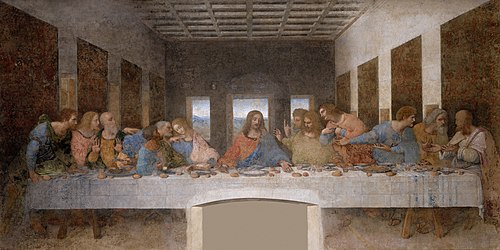
Back इसाई धर्म केरऽ इतिहास ANP تاريخ المسيحية Arabic Historia del cristianismu AST История на християнството Bulgarian খ্রিস্টধর্মের ইতিহাস Bengali/Bangla Història del cristianisme Catalan Dějiny křesťanství Czech Ιστορία του Χριστιανισμού Greek Historio de kristanismo Esperanto Historia del cristianismo Spanish

| Part of a series on |
| Christianity |
|---|
 |
| Part of a series on |
| History of religions |
|---|
The history of Christianity began with the life of Jesus, an itinerant Jewish preacher and teacher, who was crucified in Jerusalem c. AD 30–33. His followers proclaimed that he was the incarnation of God and had risen from the dead. In the two millennia since, Christianity has spread across the world, becoming the world's largest religion with over two billion adherents worldwide.
Christianity was initially a grassroots movement spread within cities by apostles, reaching critical mass by the third century when it grew to over a million adherents. The support of the Roman emperor Constantine in the early fourth century was important in transforming it into an organized religion with a formalized religious text. Constantine's support also allowed Christian art, architecture, and literature to blossom. Competing theological doctrines led to divisions. Differing doctrines produced the Nicene Creed of 325, the Nestorian schism, the Church of the East and Oriental Orthodoxy. While the Western Roman Empire ended in 476, its successor states and its eastern compatriot—which became the Byzantine Empire—remained Christian.
In the Middle Ages, western monks preserved culture and provided social services. Early Muslim conquests devastated many Christian communities in the Middle East and North Africa, but Christianization continued in Europe and Asia and helped form the states of Eastern Europe. The 1054 East–West Schism saw the Byzantine Empire's Eastern Orthodoxy and Western Europe's Catholic Church separate. In spite of differences, the East requested western military aid against the Turks, resulting in the Crusades. Gregorian reform led to a more centralized and bureaucratic Catholicism. Faced with internal and external challenges, the church fought heresy and established courts of inquisition. Artistic and intellectual advances among western monks played a part in the Renaissance and the Scientific Revolution.
In the 14th century, the Western Schism and several European crises led to the 16th-century Reformation when Protestantism formed. Reformation Protestants advocated for religious tolerance and the separation of church and state and impacted economics. Quarrelling royal houses took sides precipitating the European wars of religion. Christianity spread with the colonization of the Americas, Australia, and New Zealand. Different parts of Christianity influenced the Age of Enlightenment, American and French Revolutions, the Industrial Revolution, and the Atlantic slave trade. Some Protestants created biblical criticism while others responded to rationalism with Pietism and religious revivals that created new denominations. Nineteenth century missionaries laid the linguistic and cultural foundation for many nations. In the twentieth century, Christianity declined in most of the Western world but grew in the Global South, particularly Southeast Asia and Sub-Saharan Africa. In the twenty first century, Christianity has become the most diverse and pluralistic of the world's religions embracing over 3000 of the world's languages through "Bible translation, prayer, litergy, hymns, and literature".[1]
- ^ Sanneh 2007, p. xx.